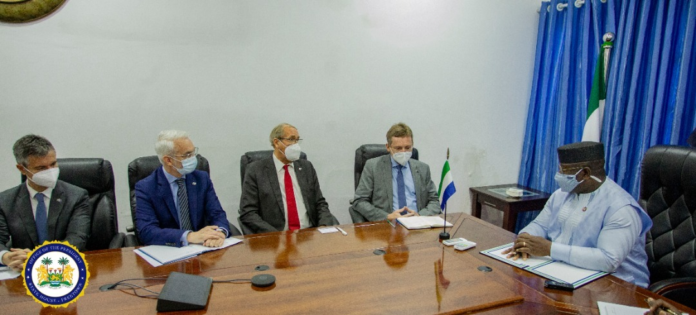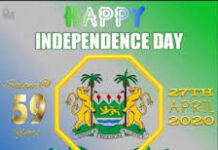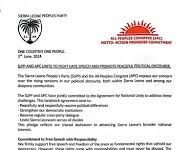See Eu press statement below:
The purpose of EU Election Follow-up Mission is to undertake a technical assessment of the state of implementation of the 29 recommendations made by the EU Election Observation Mission back in 2018. The implementation of these recommendations would enhance the credibility, inclusiveness and transparency of Sierra Leones 2023 elections.
Out of 29 recommendations put forward in 2018, 9 entail constitutional amendments though none of them would need a referendum for entrenched provisions. 21 require legal reform, whereas the remaining could be addressed through administrative policies.
The need to reactivate the Constitutional review process remains. Timely disclosure of the White Paper is a precondition for an effective, transparent and accountable process and for re-engaging all stakeholders. There is a clear consensus on many issues including that there should be a fixed date for future elections. Now the task is to turn the discussion into law in time for the elections in 2023.
The Mission has been told that there is a significant decrease in trust in the essential bodies which play integral roles in the forthcoming elections. These include the judiciary, NEC, PPRC and the police. The Mission findings are that these institutions reputations are less trusted than is needed. But further, our assessment is that there are real grounds for concern in the ways in which these bodies have administered recent bye-elections.
There are surely some lessons to be learned from the management of the last bye-election, which can be trialed in future bye-elections. The Election Follow-up Mission encourages the National Electoral Commission to engage with all electoral stakeholders to address those issues to restore confidence in the Electoral Management Bodies and strengthen both, the transparency and integrity of the electoral process.
In our assessment, the government has a role in providing both sufficient and timely funding-but equally importantly the political space- for these institutions to demonstrate their neutrality and independence which are absolutely essential for elections being recognised as credible by citizens and observers. The government has committed to the creation of a National Election Sustainable Trust fund account- which if fully implemented would address one of the recommendations. So far, the details of this have not been communicated to the NEC and other bodies.
If an election is declared void, according to section 146.4 of the Public Election Act, another election shall be held. The 2019 High Court decisions to declare the runner up elected in 10 constituencies, eroded confidence in the neutrality Judiciary.
Unequivocal respect for the rule of law in election petitions is needed to ensure confidence in the electoral process. In addition, the delivery of timely effective resolution of electoral cases, in line with the deadlines Justice delayed is justice denied; the same applies to democracy.
The Mid-Term Census is unprecedented; the stated reason for it is highly contested. The use of an optional census to provide data which might be used to change electoral boundaries shortly before an election is not conducive to the political atmosphere or good electoral practice.
The Mission repeats its recommendation that the voter register should be automatically produced from the civil register, which would save money and time. The Mission has not seen evidence that sufficient progress has been made on this important issue.
The Mission welcomes that a Bill was formally introduced in Parliament this month that has the stated aim of increasing women’s participation in public and political life.
However, the consultation process in preparing the draft was lacking. The Mission shares the hopes of many in Sierra Leone that a meaningful consultation process and clear re-drafting of the Bill will, in combination with political parties own internal policies result in at least 30% of MPs being women in 2023.
There have also been improvements regarding the Independent Media Commission.
By modifying the appointment procedures for board members, who are no longer appointed by the President, another EU recommendation has been partially implemented.
We furthermore acknowledge the achievement of decriminalising libel as a vital step ensuring and strengthening freedom of expression in Sierra Leone. This amendment of the Public Order Act addresses fully a recommendation made in 2018.
While there remain several issues of concern; there is still time remaining to address many of these issues. The Mission recommends that the powers in the Constitution be exercised with restraint and in the spirit of democratic compromise, not winner takes all.
What Bio said in Glasgow…!! 20 ‘determined Green’ Points
The President of the republic of Sierra Leone Rtd Brig. J. Bio has spoken at the 26th conference of parties of the United Nations Framework Conventions on Climate Change (UNFCCC) in Glasgow, United Kingdom.
See statement below
1. Let me, at the outset, thank Italy and the United Kingdom for convening the global community and mobilising concerted and collective global efforts to discuss and act on the single universal existential threat of our time – climate change.
2. Sierra Leone has one of the most diverse ecosystems in the world: inland wetlands and forests across 4 main relief regions, about 15,000 plant species, the most diverse fish stocks along the west coast of Africa, and 761 species of mammals and birds.
3. But we are highly vulnerable to the adverse effects of climate change, rapid biodiversity and tree cover loss, and the attendant threats to human habitat, health, food, and water security. As a consequence, other fall-outs like poverty, gender disparities, and youth unemployment are intensifying especially in the COVID-19 era.
4. We are doing the very best we can in the circumstances. We are fully committed to all international agreements and actions to develop a climate resilient future. We have established a stand-alone Ministry of the Environment and recently reviewed and updated our Nationally Determined Contribution, National Climate Change Policy, and National Climate Change Strategy and Action Plans. We have identified environmental pressure points and we are implementing coherent mitigation and adaption strategies.
5. Within our limited resources, we have underscored climate change actions in national development planning and budgeting processes in alignment with outcomes derived from the UNFCCC process.
6. We have enhanced the conservation and protection of natural habitats and ecosystems, improved meteorological services, integrated water resource management and community-based adaptation strategies in the agriculture sector, and promoted climate change risk-management.
7. We are promoting alternative renewable energy in off-grid solar networks and stepping up tree-planting to restore 960,000 hectares of depleted forests.
8. We believe that establishing a green economy should focus on restoring and protecting, investing in, consuming sustainably, and being accountable and inclusive.
9. As Prime Minister Boris Johnson recently stated, it is indeed “right and lucrative to be green” and we want to work collectively toward that goal.
10. But good climate policies and ambitions alone, such as ours in Sierra Leone, may however fall short. Additionally, due to high debt servicing, Sierra Leone lacks the fiscal space to scale up investments in climate change actions. We therefore agree with Kermit the Frog, that being African and being one of the Least Developed Countries, “it is not that easy being green.”
11. We need technical support to introduce or implement enabling regulatory and structural reforms. My government is eager to work with partners to further ease the investment climate, co-create projects, and map out incentives for potential green and ESG investments.
12. We urgently need investments in digital infrastructure and technology if we are to acquire better GIS data, improve marine conservation and management, promote nature-based solution and just rural transitions to sustainable agriculture, introduce climate-smart agriculture and food systems that preserve our forests, and provide high-yield, improved seeds to farmers.
13. We stand ready to invest in green energy sources with smaller environmental footprints. We have introduced some off-grid solar electrification to some towns but we need to expand those investments to other towns and make them even more affordable. Cheaper and affordable solar systems will expand energy access to more Sierra Leoneans.
14. We should also invest in affordable, competitively-priced, low-carbon energy sources for cooking and other domestic uses in order to avoid the indiscriminate felling of trees for firewood and charcoal.
15. We need to invest in green urban planning, sustainable urban waste management, green mass-transit transportation systems, and stricter emissions testing and enforcement to reduce emission footprints.
16. We need technical and vocational training to support the growth of jobs created as a consequence of these investments.
17. But more importantly we believe sustained investments in an equitable education will prepare young people and women especially, to respond to climate challenges, help consolidate the gains we will make from the foregoing investments, and build a more inclusive and resilient future.
18. We need support from global climate financing streams. Africa has access to less than 5% of global climate financing. We also need the support of larger economies and the international financial community to de-risk private capital and green investments.
19. At this conference and beyond, Sierra Leone is determined to engage and explore all possibilities, ideas, and partnerships to achieve our collective global goals.
20. It may not be easy being green but we, in Sierra Leone, are determined to be green.
I thank you all for your kind attention



































